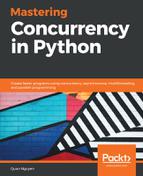Keeping Python's implementation of memory and variable management in mind, we can see that references to a given value in Python are constantly changing in a program, and keeping track of the reference count for a value is therefore highly important.
Now, applying what you learned in Chapter 14, Race Conditions, you should know that in a Python concurrent program, this reference count is a shared resource that needs protection from race conditions. In other words, this reference count is a critical section, which, if handled carelessly, will result in an incorrect interpretation of how many variables are referencing a particular value. This will cause memory leaks that will make Python programs significantly inefficient, and may even release a memory that is actually being referenced by some variables, losing that value forever.
As you learned in the previous chapter, a solution to making sure that race conditions will not occur with regard to a particular shared resource is to place a lock on that resource, effectively allowing one thread, at the most, to access the resource at any given time within a concurrent program. We also discussed that, if enough locks are placed in a concurrent program, that program will become entirely sequential, and no additional speed will be gained by implementing concurrency.
The GIL is a solution to the combination of the two preceding problems, being one single lock on the entire execution of Python. The GIL must first be acquired by any Python instruction that wants to be executed (CPU-bound tasks), preventing a race condition from occurring for any reference count.
In the early days of the development of the Python language, other solutions to the problem described here were also proposed, but the GIL was the most efficient and simple to implement, by far. Since the GIL is a lightweight, overarching lock for the entire execution of Python, no other lock needs to be implemented to guarantee the integrity of other critical sections, keeping the performance overhead of Python programs at a minimum.
